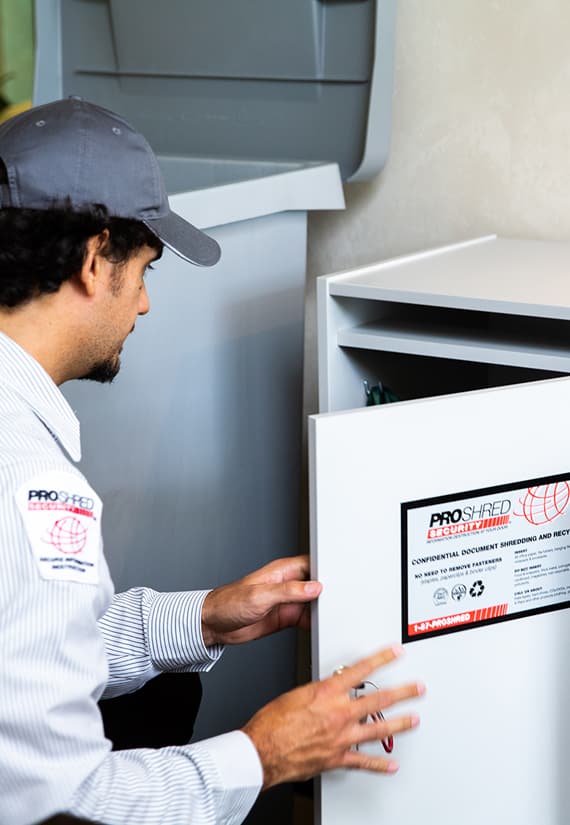October 31, 2024
The Importance of Legal Record Shredding
Every year, thousands of sensitive legal documents are generated, containing confidential information that, if not properly disposed of, can lead to identity theft, data breaches, or legal liabilities. Legal documents, from contracts to court filings, require meticulous attention during disposal because of the sensitive data they contain. Ignoring privacy laws and regulations can expose businesses to significant risks, including fines and lawsuits. In this blog, we’ll explore why legal record shredding services, including ongoing shredding, are essential and how legal document shredding protects businesses from these threats.
What Is Legal Shredding?
Legal shredding refers to the secure and systematic destruction of sensitive legal documents to ensure that confidential information remains protected. Legal shredding services ensure that critical documents are thoroughly shredded, rendering them unreadable and unrecoverable. These services are crucial for law firms, businesses, and individuals who handle legal paperwork that must be disposed of in compliance with strict regulations. Incorporating ongoing shredding as part of these services ensures continuous protection and compliance.
Several types of documents necessitate legal document shredding, including:
- Contracts
- Client records
- Court filings
- Discovery materials
- Financial documents
- Any paperwork containing personal data, sensitive business information, or legally privileged content must be handled carefully to avoid potential breaches.
Risks of Not Shredding Legal Documents
Failing to utilize legal shredding services, including ongoing shredding, for sensitive legal documents can lead to significant risks, such as identity theft and fraud. When confidential information like personal details, financial records, or legal agreements are not securely destroyed, they can easily end up in the wrong hands. Criminals can exploit this data for identity theft or fraudulent activities, putting both individuals and businesses at risk.
Improper disposal of legal documents exposes businesses to legal liabilities. Many industries are bound by regulations like HIPAA, FACTA, and GDPR, which require the secure destruction of sensitive information. Failing to comply with these laws through proper legal document shredding can result in costly lawsuits, fines, and other penalties.
The reputational damage caused by mishandling legal documents can be long-lasting. If a data breach occurs due to inadequate disposal practices, the trust customers place in your business could be irreparably harmed. Utilizing legal shredding services and maintaining an ongoing shredding schedule not only protects against legal repercussions but also ensures your company’s reputation remains intact by safeguarding confidential information.
The Role of Professional Shredding Services
Choosing professional legal shredding services like Proshred Seattle offers several advantages over in-house shredding. Professional services provide secure processes that ensure all sensitive legal documents are thoroughly destroyed, eliminating the risk of recovery or data theft. They also offer efficiency, handling large volumes of documents quickly, freeing up your team’s time. Regular pickups as part of an ongoing shredding plan mean that you don’t have to worry about storing sensitive documents for long periods, reducing the risk of data breaches.
When it comes to legal document shredding, there are two main options: on-site and off-site shredding. On-site shredding is often the preferred choice for legal clients, as it allows them to witness the shredding process firsthand with secure mobile shredding trucks, ensuring complete security. Proshred Seattle offers mobile shredding units that come directly to your location, providing peace of mind. Off-site shredding, while still secure, may introduce more opportunities for risk, as documents are transported to another facility.
Professional shredding services like Proshred Seattle also adhere to the highest industry standards, such as NAID AAA Certification. This certification ensures that shredding is carried out according to strict protocols, ensuring compliance with privacy regulations and safeguarding your legal information.
Best Practices for Legal Document Shredding
Adhering to legal retention schedules is a critical best practice for legal document shredding. Legal documents must be kept for specific periods depending on the regulations governing your industry, such as tax records, contracts, and client files. Before engaging in legal shredding services, businesses should ensure they follow these retention guidelines to avoid destroying documents prematurely or keeping them longer than necessary, which could increase risks.
By establishing clear procedures for legal document shredding, including ongoing shredding strategies, companies can ensure consistent practices across all departments. This policy should outline when and how documents should be shredded, who is responsible, and how often shredding will occur. Partnering with professional legal shredding services like Proshred Seattle can help streamline this process.
All staff members should be educated on what types of documents need shredding and how to properly handle confidential information. Training ensures that sensitive materials aren’t mistakenly discarded or left unprotected. With the right training, employees can be confident in knowing when to use legal shredding services, helping the company stay compliant and secure.
Reach Out to Proshred Seattle for Legal Shredding
For businesses handling sensitive legal documents, partnering with a professional shredding service is essential for ensuring compliance and security. Proshred Seattle offers reliable, secure legal shredding services tailored to meet the needs of law firms, corporations, and individuals. With our expertise in commercial paper shredding and ongoing shredding solutions, we help protect your business from potential legal and financial risks. Don't leave your sensitive documents vulnerable—trust Proshred Seattle to safely and efficiently handle your shredding needs. Contact us today to learn more about our legal shredding services and schedule a consultation to safeguard your confidential information.

